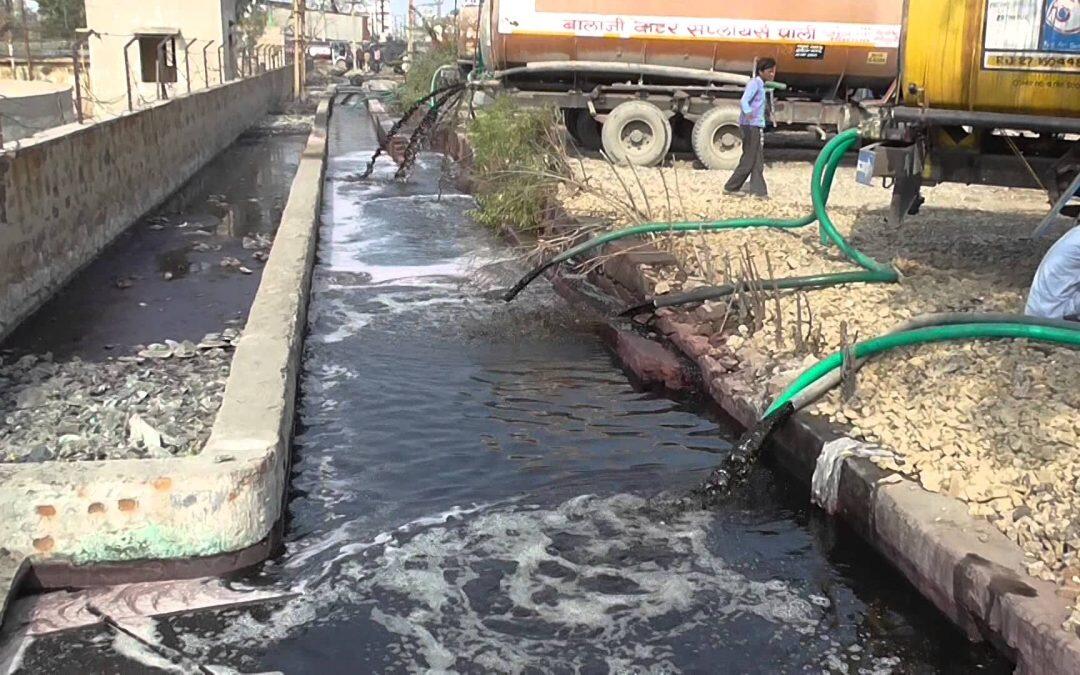Two decades of unprecedented and rampant pollution and various eyewashes due to textile dyeing printing industry in Pali affecting hundreds of villages! Finally , the legislators seem to have woken up to the issue.For the first time since the past decade and a half or perhaps even more, the committee on environment led by MLA Bhagirath Choudhary will be visiting the impacted villages and thousands of people who suffered because of this pollution which found its way into groundwater.
The result portrays the most dismal picture wherein thousands of acres of once fertile land turned barren and the polluted groundwater reportedly wreaked havoc in terms of cancer, asthama and other diseases in the area.Unfortunately , while such cases abound, no health surveys have been conducted in the area while untreated hazardous effluents from almost 600 of these industries continue to find their way into the Bandi river, a seasonal river.
Even the samples taken in April and May this year by the State Pollution Control Board failed in terms of the heavy metal content and other parameters.
The committee with its eight MLAs shall be accompanied by the officials of the State Pollution Control Board and would also visit the Bandi Nehda dam, originally meant for harvesting the rain water for cultivation but ended up being a victim of this industrial pollution itself.The visit is scheduled on July 29. Incidents of fish dying owing to the polluted water and even the livestock getting afflicted and perishing is ailing the farmers in the area. With the fertile land turning barren, the once effluent farmers have been rendered landless and forced to work as daily wagers to fend for themselves. In addition to Pali, the committee shall tour six other cities to assess the ground status of pollution including Bhilwara, Chittorg arh, Mount Abu, Sirohi, Beawar and Kishangarh in Ajmer. It is to be mentioned that so far, the ground situation defies the tall claims of the authorities while little has been done to follow the instructions issued by the high court and the National Green Tribunal as well.
Ironically, the area does not have enough ground water and has been battling with drinking water crisis since long but these industries have simply flourished while the agriculture suffered a major setback. Ground situation despite six Common Effluent Treatment Plants (CETP) working officially ‘on papers’ is that three of these are not working, one is still using the old technology and while one is yet to be constructed de spite much delay . Interestingly, the one CETP which was on a trial run for Zero Liquid Discharge is still discharging polluted effluents into the stream while failing to live up to its claims.
If the findings of a report sent to the state government are to be believed, four of these treatment plants do not have the provision to treat the effluents up to tertiary level as part of the pollution control measures. These units are reportedly `not complying the instructions for water recycling, low water consumption, effective chemical consumption techniques, adoption of modern technology for energy and water conservation and reduction of pollution load’. At the same time, findings suggest unauthorized expansion of plant and machinery as well.
Mahaveer Singh Sukarlai, an environmentalist and convener of Kisan Paryavaran Sangharsh Samiti, said wells earlier used for drinking water are now full of foul smelling coloured water. “Notices are issued regularly but are a mere eye wash. Strict action should be taken against those responsible for polluting the groundwater risking human lives in addition to leaving the land unfit for agriculture. Even though steps can be taken to stop further pollution, the groundwater here shall stay polluted forever since there is no technique till date to treat the polluted groundwater,” he said.
Source: IndiaTimes











